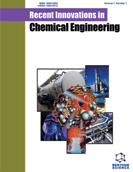Abstract
Background and Objective: In this work, the precipitation combined with vacuum drying and supercritical CO2 drying was applied in the preparation of Mg(OH)2 which was thermally decomposed to MgO.
Results: Results showed that the constant dropping rate of Mg(NO3)2 solution into NaOH aqueous solution under 90°C with a relatively high pH of 10.1 led to the MgO powder with high specific surface area and large pore volume with both vacuum drying and supercritical drying. Among the produced MgO, the pore volume1.45 cm3/g from the vacuum drying was the highest, and the bulk density 0.0247 g/ml from the supercritical drying was the lowest in the reported literature.
Conclusion: Particularly, the MgO produced from the supercritical drying showed high adsorption of Pb2+ (as high as 3635 mg/g at pH=6 and 25°C) and Mn2+ (as high as 861 mg/g at pH=6 and 25°C). The adsorption isotherms and kinetics of Pb2+ and Mn2+ on the produced MgO were fitted well to the Langmuir model and pseudo-second order model.
Keywords: Adsorption, lead, manganese, magnesium oxide, supercritical drying, silica.
Graphical Abstract

















